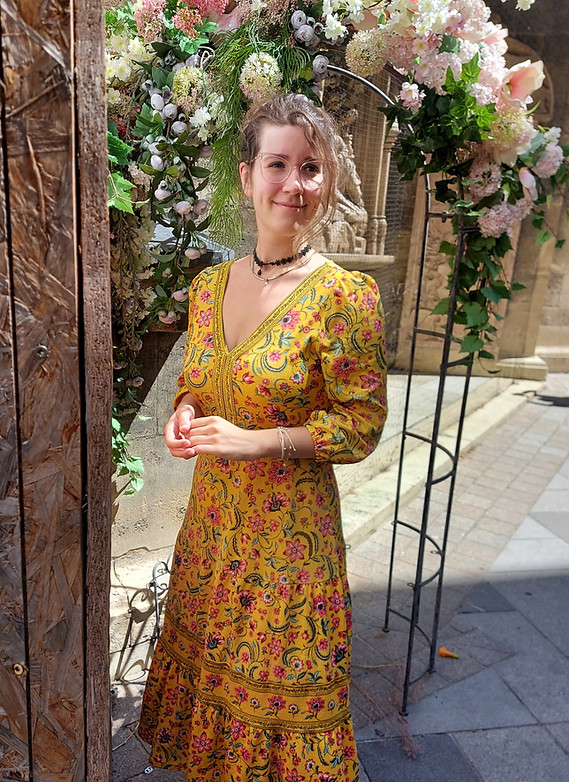Biography

Abigél Varga was born in Eger, Hungary, 1996. She studied at the Franz Liszt Academy of Music Budapest between 2015-2021 as a student of Judit Varga, Zsófia Tallér and Péter Tornyai in composition. Between 2021-2023 she was a student of Moritz Eggert at the Hochschule für Musik und Theater München, in the Komposition Meisterklasse postgraduate programme, which she has completed with the performance of her piece EMBRACE - Oratorium in zehn Teilen mit vier Sängerinnen und Tanzchoreographie, basierend auf der psychologischen Theorie von Carl Gustav Jung (1865–1961).In 2019 10th May Abigél performed the composition of Kurtág György titled ...sleep no more... Seven songs, op. 50 (2019) - dedicated to Judit Rajk and the performers of the premiere (May 10, 2019 at FUGA) at FUGA Concert Hall as an assistant in preparing the piano, and participated the rehearsals of the composition directed by Kurtág György.In 2023 Abigél was selected for the Cité Internationale des Arts Paris Residency. In 2024 she was also selected for the Music Residency Programme of BASIS Vinschgau Venosta | Social Activation Hub.In 2023, Abigél was selected as one of the participants of the Lucerne Festival Composer's Seminar by Wolfgang Rihm and Dieter Ammann, together with seven other young composers from over a hundred applicants. The seminar and final concert took place in August 2023, with the mentorship of Dieter Ammann and Unsuk Chin.Her music composed as an accompaniment for the theater-piece of Lackfi János titled Hinták was performed on the Ars Sacra Festival, and two compositions of her were premiered (Images on a Theme, Alba e Tramonto) by the Annie Fischer Scholarship-winner artists on the Cafe Budapest Contemporary Art Festival. In January 2021, the MIKAMO Central European Chamber Orchestra performed her composition Rosamunde - Entr’acts Second Interlude at the Palace of Arts, composed for the commission of the Transparent Sound Festival, conducted by Ajtony Csaba.Beside composing, Abigél also takes part in musical life as a concert organiser and event manager. She worked as an event organiser assistant in the concert organisation department of FUGA alongside Judit Rajk, curator of classical music events. She was artistic coordinator and concert organiser at the Crescendo Summer Academy in Tokaj. She participated in the organisation of the aDevantgarde Festival in Munich as a co-organiser.
Projects
LISAS LAND DES LÄCHELNS
EINE DATING-OPERETTE NACH FRANZ LEHÁR VON ABIGÉL VARGA (MUSIK) UND ELISABETH PAPE (TEXT) – LIEDTEXTE LUDWIG HERZER, FRITZ LÖHNER-BEDA UND VICTOR LÉON



By the invitation of the Neuköllner Oper, Abigél Varga (music) and Elisabeth Pape (text) looked at Lehár's world-famous operetta about the encounter between two cultures from two worlds in terms of its contemporary relevance and brought the original plot into today's polyglot Berlin. The young author and Kleist Prize winner Elisabeth Pape lovingly slims down the original to a quartet of young people who are looking for love and an idea of themselves. The Hungarian composer Abigél Varga undertakes a special work: she comments with her own artistry on Lehár's original arias, duets and orchestral compositions and rearranges them for a colorful and multifaceted ensemble, in which the Guzheng, the Chinese vaulted zither, cannot be missing.

Instrumentation:
Flute, Clarinet/Bass Clarinet, Guzheng, Trombone, Accordion, Cello, Vibraphone
More informations about the piece:
https://www.neukoellneroper.de/performance/lisas-land-des-laechelns/
EMBRACE
Oratorium in zehn Teilen mit vier Sängerinnen und Tanzchoreographie, basierend auf der psychologischen Theorie von Carl Gustav Jung (1865–1961).
The main theme of this piece is the inner development of a person. The psychologist Carl Gustav Jung writes that every individual has a shadow side that they cannot accept or try to hide. Based on his theory, this piece describes the complex relationship between the individual and the shadow in a person. There are three projections that play an important role in shedding different light on this relationship. They represent the three emotions of the individual – the Cheerful, the Modest and the Passionate - and accompany her like guardian spirits. Sometimes they are playmates of the individual, but at other times they rebel against the shadow.
The work is divided into 10 parts with the following titles:
1. Cradle - 2. Playground - 3. Church - 4. Alley - 5. Blooming - 6. Ritual - 7. Forest - 8. Dream - 9. Outside - 10. Meetings
This inner journey gives a picture of how our emotional scale develops from childhood to adulthood, and how our environment can affect our personality.
